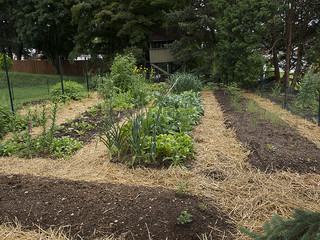No Till Gardening: Back to Eden Method for Easy Virtually Weed-Free Gardens

Paul Gautschi developed Back to Eden no till gardening after he spent time wondering about the plush green trees of the forest during periods of little rainfall. He maintains that nature does not expose soil to the elements, it is man who creates the dust bowls and rock hard soil during drought.
After seeing dead pine needles, decaying wood and leaves cover the forest floor, he began to create a cover for his plants of wood chips in various stages of decay.
His process of layering mulch and animal-based fertilizers resulted in minimal watering, protecting topsoil and eliminating the need for weeding. It does require planning to get started, so establishing your garden at your survival shelter now, will provide you with the produce you need in times of food shortages.
Getting Started No Till Gardening
Paul believes in a spiritual relationship with God, the Creator and connects spiritual steps with the physical steps of his cultivating process and his treatment of his land is his tribute to the Creator. Regardless of your level of spirituality, the physical steps to Back to Eden no till gardening are straight forward with:
- Procure the covering
- Apply the covering
- Plant seeds
- Nourish your plants
- Water, if necessary
- Replenish the covering after the harvest
Procure the Covering
Paul encourages the gardener to use wood chips which will eventually breakdown and provide nutrients to the soil, and whatever materials are available such as:
- Grass clippings
- Newspaper
- Leaves
- Rocks
- Seedless hay or straw
Back to Eden no till gardening means you are not going to till the soil, which is contrary to common practice and instead you add layers of nutrients over the soil.
Apply the Covering
You should get rid of any obvious weeds before applying the layers and then:
- If it is available, place three to four newspaper sheets on the soil.
- Apply three to four inches of some type of fertilizer such as composted manure or organic compost.
- Add two to four inches of wood chips
Some wonder if the Back to Eden gardening is simply enhanced mulching but it is more than spreading wood chips on your garden. Fertilizing the soil and continuing to enrich the soil with compost and fertilizer is necessary for success.
Plant Seeds
The main caution for planting is that you make sure your seeds are in the soil as plants won't or can't grow in wood chips or newspaper. Since you have created some layers, you simply rake away the layers until you reach soil in order to plant your seeds.
Wait for the plant to sprout then pull the cover around it. Heirloom seeds, which produce plants whose seeds you can sow the following season, are preferred as you don't have to rely on being able to purchase or trade for new seeds each season.
Nourish Your Plants
Whenever it rains or if you water the plants, the nutrients from the layers wash into the soil. You should use composted manure from chickens if you have them or you can make your own fish emulsion to enrich the soil.
Water the Plants
Water is necessary to germinate the seeds but you should feel the soil to determine how much water it really needs. The good part about wood chips is that they absorb excess water and provide a cover to hold water in the soil making it more difficult for it to evaporate.
Replenish the Covering
After you harvest the vegetables, you can add more covering as necessary. The fall is a good time to add your additional wood chips, manure and compost as it has time to decompose and begin to work its way into the soil.
The Back to Eden no till gardening process is a good prepper technique, as it doesn't require farm machinery to till the land for your crops and you use the resources that are available to you in your surroundings. A free documentary film "Back to Eden" gives details about the process and you can connect with others who are looking to use and are using this form of cultivation even for potted plants in apartments.
Return from Back to Eden No Till Gardening to Backyard Farming





New! Comments
Have your say about what you just read! Leave me a comment in the box below.